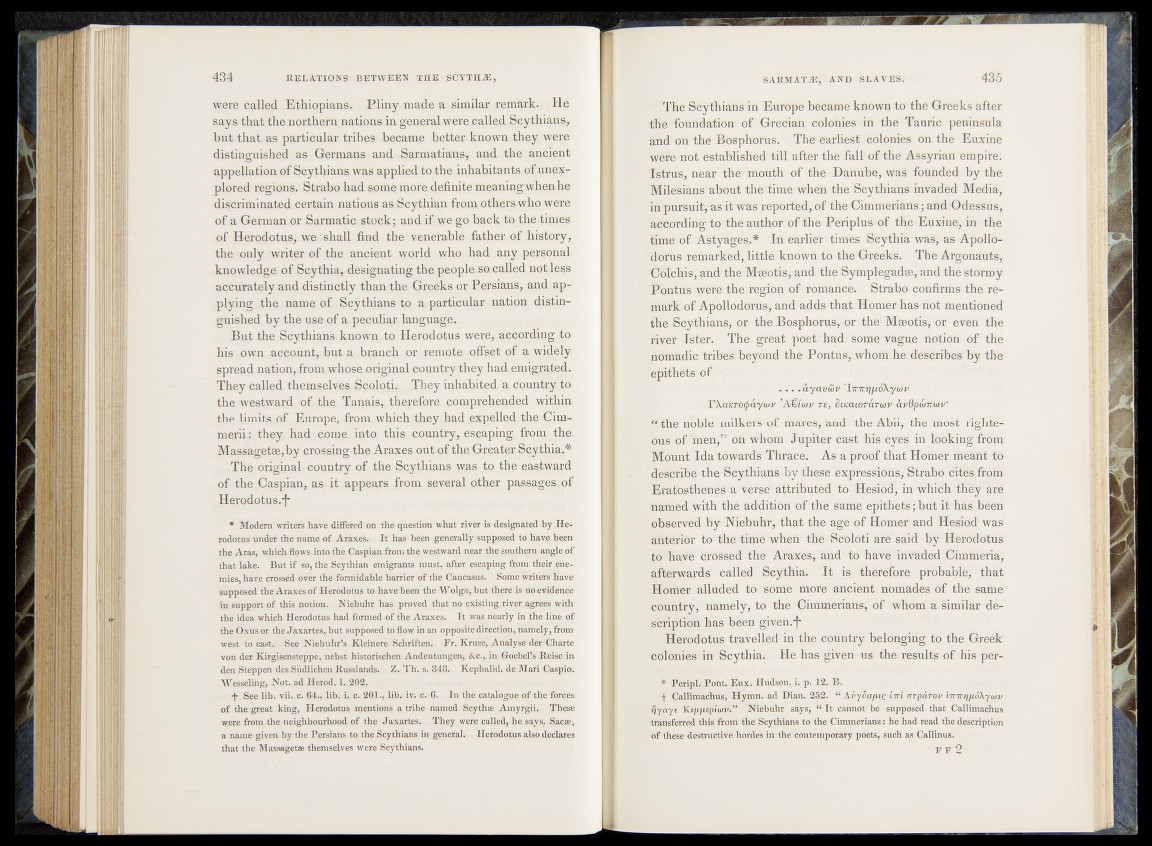
Were called Ethiopians; Pliny made a similar remark. ■ He
says th a t the northetnnalians in general were called. Spy thia$|,' j
but th a t as particular tribes* became better known they were
distinguished as Germans and Sarmatians, and the ancient
appellation pf §©ytbdans was applied to the/inhabitants ,o£unex-
plored legions. Strabo had aomemoTre definite meaning when he
discriminated certain nations a^fScythian from others who were
of a German or Sarmatic stock; and if we?go hack to the,timt£®
of Herodotus, we shall find the venerable father. ,pf history,
the? only writer of the ancient world who had any personal
knowledge" of Scythia, designating the^people-sosQ^led .not Jess
accurately and distinctly than the. Greeks or Persian^, and ,ap~
■plying, the name of Scythians to a particular nation distinguished
by the use,of a peculiar language.
But the Scythians known to Herodotus vvere, accoridingj.|fo
his own account, b u ta branch o r ' r em o t e , p f . ^ y i ^ e j y
spread nation, from whose original country they h a d emigrated.
They called themselves Seoioth , They inhabited a country to
the westward of the Tanais, therefore^comprebendgd within
the limits of Europe, frpm which tfiey^ad expellej^^heCina-
merii: they had come into this, .country,^ escaping* from the,
Massagetap,by crossing the Araxes out of the G^e^ter, pcy thia,#
. The original country of the Scythians was to. the .eastward
g f the Caspian, as it appears from several other passages of
Herodotus.-f*
• Modem writers have differed on the questionwhat river is designated by Herodotus
under the name of Araxes. I t has been generallyvsupposed to have, been
the Aras, which flows into the. Caspian from the westward near th? southern angle of
that lake. But if "so, the Scythian emigrants must, after escaping from tKelr enemies,
have crossed over the fomiidahle harrier of the Caucaisus. Somewritefs have
supposed the Araxes of Herodotus to have been the Wolga, but .there is no evidence
in support of this notion. Niebuhr has proved that no existing river, agrees with
the idea which Herodotus had formed oif the Araxes. I t was nearly in the line of
theOxusor the Jaxartes, hut supposed to flow in anopposite direction, namely, from
west to east. See Niebuhr’s Kleinere Schriften. Fr. Kruse? Analyse der Charte
von der Kirgisensteppe, nebst historischen Andeutungen? :&c.-,;Sb Goebel’s Reise In
den Steppen des Südlichen Russlands. Z. Th. s. 348. Kephalid. de Mari Caspio.
Wesseling, Not. ad Herod. 1. 202.
•j- See lib. vii. c. 64.,, lib. Lc. 201., lib. iv . c. 6. In the catalogue of the forces
of the great king, Herodotus mentions a tribe named Scythte Amyrgii. These
were from the neighbourhood of the Jaxartes. They were called? he says, Sac®,
a name given by the Persians to-the Scythians in general. Herodotus also declares
that the Massagetse themselves were Scythians.
!The Scythiuns-in Europe became known to the Greeks after
thè*#nndatrorMof' Grecian ‘Colotiies^ifi the Tauric peninsula
âtfd‘ on the'Bosph'érUèir -Thc'earhbslr colonies on the Euxine
were not > established*till after the fall of the Assyrian empire.
Istrutf, near' 'the^tnouth- of the Danube, was founded by the
MilëâlhnS' about the time when'- thef Scythians iriv&ded Media,
!hpur^ui%lks" it' wk'sfi-ejjbr tedf©f '-thëftCimm erâhiite; and OdessUs,
'according to*the aufchè#óf the Pèriptuè of the Euxine, in the
tinSë 'óf Ast^geW* -‘M earlier" trfiféW^bythia was-, as Apollo-
^o'Ais’ remarked,'littlè' knó&ri tb.'the-Greeks. The Argonauts,"
^blfclfe, and the Mæofis,hnid’ theS^fi$iip l^ â d 1éd| àÉnd the stoTmy
T’ontus wbfe' the^bgiOn» of’ romance..'; #trà*b@! Confirms the 'fë-
mark' of Apollodorus, and^addSThat Homer B&^ntot’ mentioned
the^Scythians, or the Sbsphofus, ©r thëf MsèofciS/ or evën the
river feter: The'! grêat"fièéfe had some vague hoti©HJ‘of thd
’Éomadie>'%iibêà' beybnd the- Poiatus; whom^hô'dbsçrtbê^by füM
epithets'df*/
' . ï . à y a v i ï î v
^ ^ Ê ê tio y 't e ?, dq£a;toT<Lr<iêv àvffp&ir'tDv’- '
'<ff,the noble- milker àt<Sf and the Abii,-Hè'most righfe-
^ouSpbf;rmén,’’-oh whoih’ J'upitèr c&'St1 hl^ëyes1"' in looking frbih
Mount Ida towards Thracè. As afprotifi tHat Hbrn^rfleant to
describe ffieSfeythians by thë’së nxpïessiô'ns, Stfahëcîïés from
Ef§£osthenés‘ a vbr'se attributed; to HesiSd'/in which* tKèy'are
named with the addition of the samë-ëpithéts'; but it has'ndetf
observed by Niebuhr, that the agC of Homer and Heëïöd was
ante ribt to tile tinSe wheti the Bèfilbti àfë’sUid by Herodotus
to have crbësed' th‘é"' Arasés, and t b * vaded GMmeria,
afterwards called Scythia. It is - therefore probable, that
Homer alluded to sbibe more ancient nomades óf the sam®
cbdntry, namely, to the Cimmerians, of whom a similar description
has been giVënlf
Herodotus travelled in the country belonging to the Greek
cöloniés in Scythia» He has* given us the results of his per-
* Peripl. Ponù Eux. Hudson, i., p. 12. B.
^ Callimachus, Hymn. ad Dian. 252. “ A H y S a /u ç t i r l a r p a r o v iTrTrr}fii,ó\ymv
f j y a y t KijujuspIwvJ’ Niébttht says, “ I t cannot be supposed that Callimachus
transferred this from the Scythians to the Cimmerians s he had read the description
of these destructive hordes in the contemporary poets, such as Callinus.
. F F 2